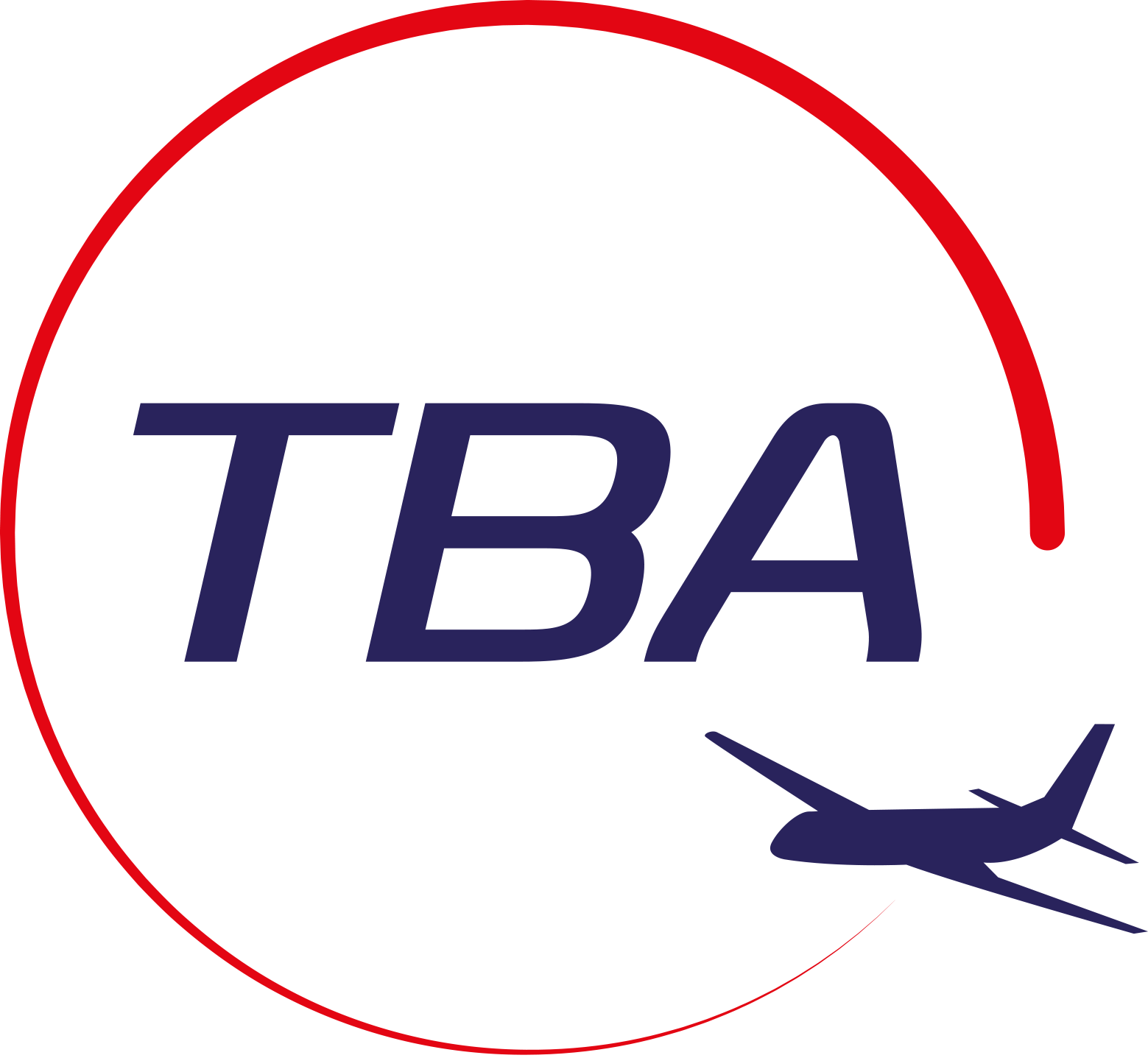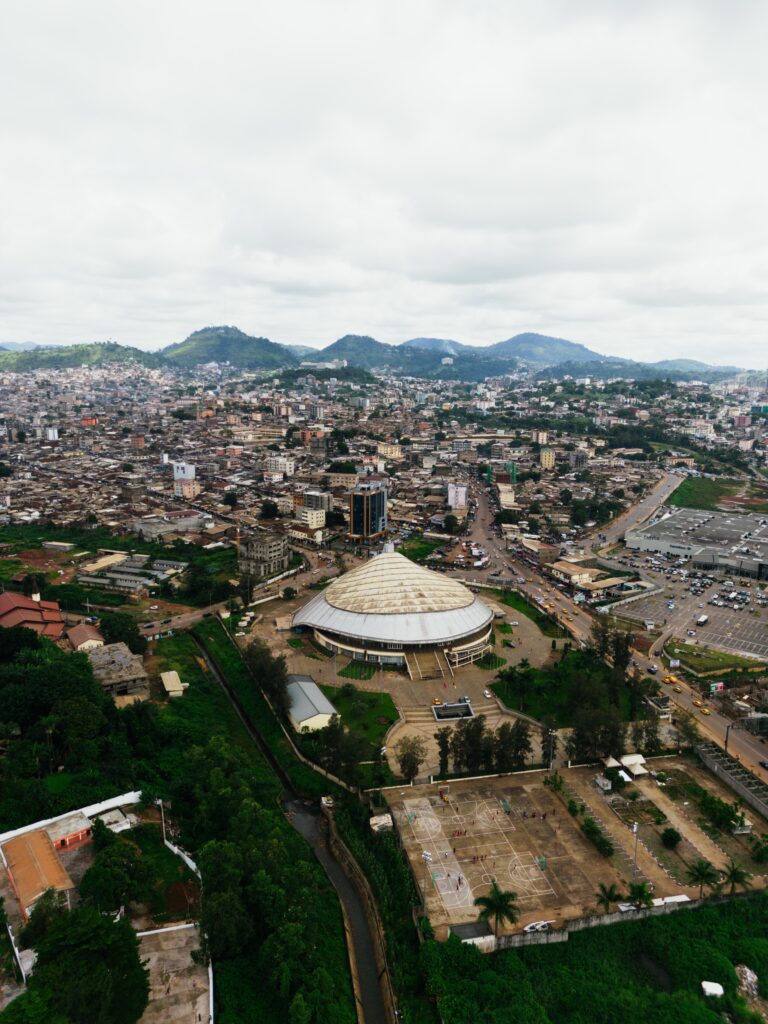
Research and knowledge are the first steps for Cameroon Travel Business Assistance. Here is a fact file for Cameroon to get you started. Contact us if you are looking to start a business in or expand your market to Cameroon. We have consultants ready to help you on the ground in Cameroon.
Let Travel Business Assistance handle your market entries – Schedule a free consultation to learn how we can help.
Basic Facts
Origin of the name: The name “Cameroon” was coined by the European traders when they arrived in the fifteenth century and Cameroon was the exonym given by the Portuguese to the Wouri river in Douala, which they called Rio dos Camarões—”river of shrimps” or “shrimp river”, referring to the then-abundant Cameroon ghost shrimp. This name became Cameroon in English.
Independence: The territory of Cameroon became a German colony in 1884. After the defeat of Germany in World War I, Cameroon became a League of Nations mandate territory and was split into French Cameroon and British Cameroon in 1919. On January 1st, 1960 French Cameroon gained independence and was joined by British Cameroon on October 1st, 1961. Under president Ahmadou Ahidjo.
Government: Cameroon has been ruled by two presidents since its independence. The President of Cameroon is both head of state and head of government. A prime ministerial position exists and is nominally head of government, implying a semi-presidential system.
Official Languages: French and English Indigenous Languages: Over 275 with dominant languages. However, some accounts report around 600 languages.
Population: 28,6 Million
Time Zone: GMT+1
Climate: Tropical
rain forest in the south up to Sahelian in the North
Borders: South-Est: Atlantic Ocean – West: Nigeria – North East Chad – East: Central African Republic – South East: Republic of Congo – South: Gabon and Equatorial Guinea
Size: 475,442 sq km (183,569 sq miles) larger than the size of the state of California in the USA.
Religion: The predominant faith is Christianity, practiced by about two-thirds of the population, while Islam is a significant minority faith, adhered to by about one-fifth. The Constitution provides for freedom of religion in Cameroon. The country is generally characterized by a high degree of religious tolerance.
Currency: CFA Franc (XAF), there is a fixed exchange rate between CFA Franc and Euro (1 Euro = 655 CFA Franc) The exchange rate with other currencies is floating. 1 US Dollar (USD) currently about 601.52 CFA Franc (XAF) (04 July 2023)
https://www.oanda.com/currency-converter/en/?from=XAF&to=USD&amount=601.529
History and Key Events
· 1520 – The Portuguese set up sugar plantations and began the slave trade in Cameroon.
· 1600s – Dutch take over slave trade from the Portuguese.
· 1884 – Cameroon becomes the German colony of Kamerun.
· 1911 – Under the Treaty of Fez -signed to settle the Agadir Crisis Franco-German conflict over Morocco – France
cedes territories to the east and south to Cameroon.
· 1916 – British and French troops force Germans to leave Cameroon.
· 1919 – London Declaration divides Cameroon into French (80%) and British administrative zones (20%). The
British zone is divided into Northern and Southern Cameroons.
Independence
· 1960 – French Cameroon granted independence and became the Republic of Cameroon with Ahidjo as president.
· 1961 – Britain’s Cameroon colonies were divided between Cameroon and Nigeria after a referendum. A large-scale
insurrection mars the country’s first years of independence until it is put down in 1963 with the help of French forces.
· 1966 – National Cameroonian Union formed out of six major parties and became the sole legal party.
· 1972 – Cameroon becomes a unitary state following a national referendum and is renamed the United Republic of Cameroon.
Cameroonian Food
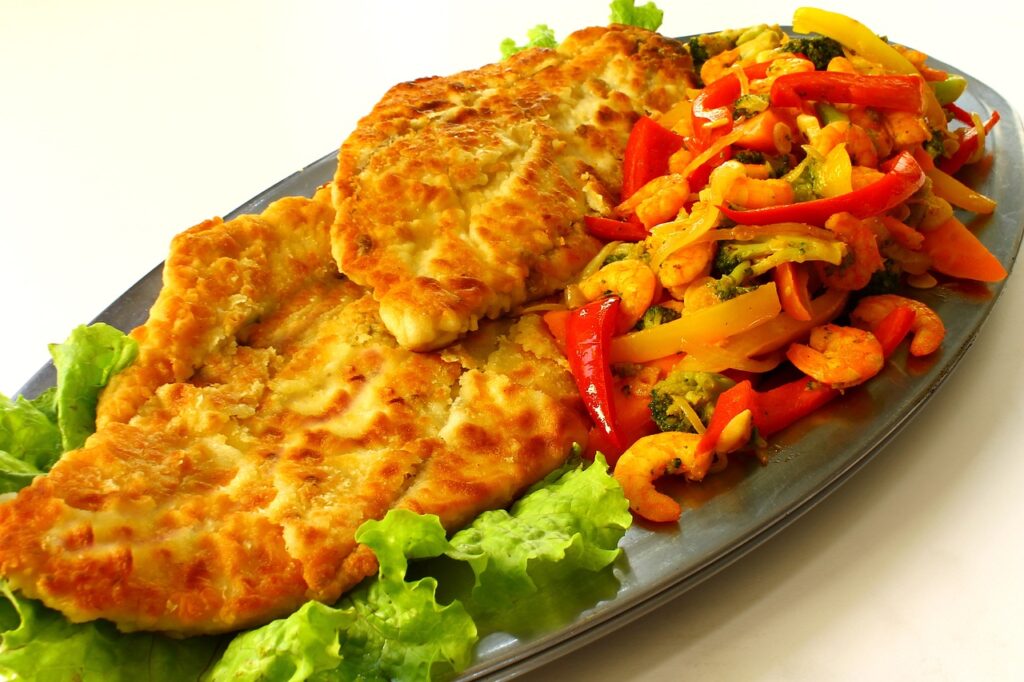
Cameroon gastronomy is renowned as one of the most refined and diverse in Africa. One of the Cameroon national dishes has acquired international fame as “Ndolè” has been ranked Number 47 in the 2023 Top 50 best cuisines in the world.
Cameroon cuisine is refined thanks to the use of spice blends that create the most epic meals. Cameroon has a mix of diverse ethnic and cultural groups and this results in versatile dishes. Cameroon cuisine is influenced by Portuguese, French, and German; however, Cameroon has remained true to its traditions by continuing to provide a rich variety of traditional food.
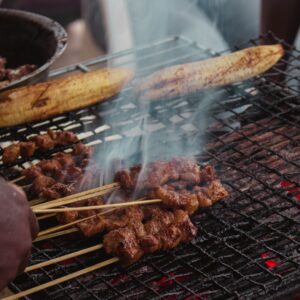
Among Cameroonian specialties are:
- Fufu corn and njama name (huckleberry leaves)
- Brochettes, known locally as soya (a kind of barbecued kebab made from chicken, beef, or goat)
- Sangah (a mixture of maize, cassava leaf, and palm nut juice)
- Mbanga soup and kwacoco
- Eru and water fufu
- Koki (primarily consisting of blackeyed peas and red palm oil)
- Achu or taro (cocoyam fufu with an orange/yellow red palm oil soup)
- Mbongo tchobi (a spicy black soup made with native herbs and spices)
- Egusi soup (ground pumpkin seeds often cooked with dark leafy greens or okra)
- Kondreh (stewed unripe plantains with herbs and spices, usually cooked with goat meat)
Curries, soups, and fish dishes abound, as well as meats on skewers.
Eru: The stew consists of eru (Gnetum africanum) stewed with spinach (commonly called waterleaf in Cameroon), palm oil, and either smoked fish, dried crayfish, cow skin (called canda in pidgin), or beef. It is served with water fufu (a slightly sour, boiled, and pounded starchy cassava) or pounded garri (roasted granular starchy food material made from cassava)
Groundnut soup, sauce d’arachide in French, is a peanut soup made by blending roasted peanuts (groundnuts) in a food processor.
Ndolé is a traditional dish of the Duala people of one of the coastal regions of Cameroon. It is a peanut-based stew made with ndolé leaves (also called bitter leaves), crayfish, beef, and spices.
Sangah is a one-pot vegetable dish from the southern and central regions of Cameroon. The main ingredients are black nightshade leaves, commonly called zoom, palm nut juice, fresh corn grains, and sugar (optional).
Okro Soup: Of ten people visiting patients in the hospital, at least seven will have this soup in their basket.
Things to do and see
West and North West region:
- The Chieftaincies and Fons (traditional Leaders), etc, and the cultural regalia they possess (Traditional dresses, dances, etc).
- The Sultanate of the Bamouns (In Foumban) and its Arts Market
- Natural lakes and crater lakes in this region (The famous Nyos saturated with gas which caused the 1986 disaster)
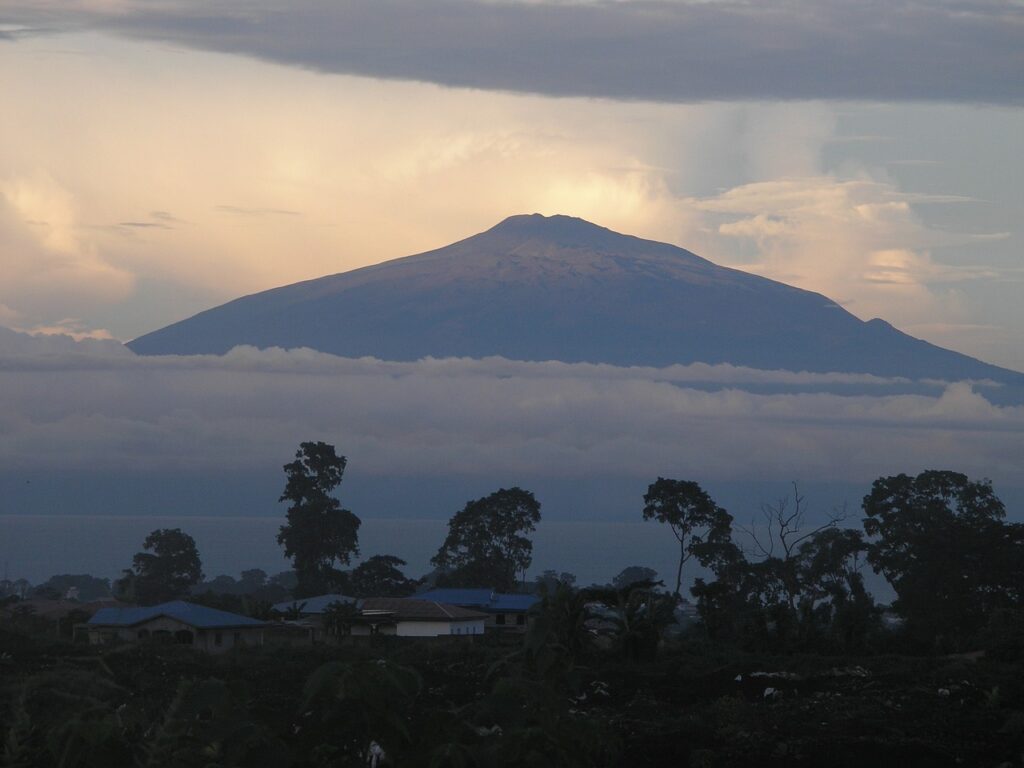
Northern Region
- Mt. Cameroon (or Buea Mt., in Buea) one of the highest mountains in Africa, is an active volcano, the remnants of the last eruption in 2012 can be visited. The mountain is also the scene of the annual Race of Hope.
- The Limbe natural sea beach.
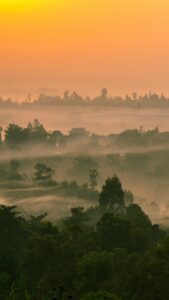
Littoral region
- Cap Cameroun Island
- The Ekom-Nkam Waterfalls, (about 50km from Melong City, near the town of Nkongsamba)
- The Manengouba mountain and the Twin crater lakes at the summit. (about 50km from Melong, near Nkongsamba)
The Southern & Eastern Regions
- Pygmy’s settlements
- Natural reserves and wildlife (rain forest): The gorillas of Mengume (near the town of Ebolowa), Forest Elephants in the Eastern region
- Waterfalls
- Kribi/Ebodj
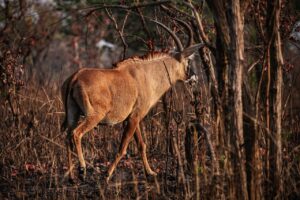
Adamawa, North & Far North Regions:
- The Roumsiki Rocky summit
- The Adamawa plateau
- The Waza Park (Natural Reserve)
- The Lamido’s Palace
- Lake Chad
- Village of Pouss
Economy
Since becoming independent in 1960, Cameroon has become one of the most prosperous African states, standing as the largest economy in the Central African Economic and Monetary Community (CEMAC). To protect its economy from recession and maintain confidence in its currency, the Central African CFA franc, Cameroon employs strict fiscal adjustment measures. Cameroon enjoys a positive trade stance thanks to its exports of natural resources, including petroleum, minerals, timber, and agricultural products, such as coffee, cotton, cocoa, maize, and cassava. Based mainly on its production of natural gas, Cameroon’s economy was predicted by the World Bank to grow by 4.3% in 2020.
Doing Business In Cameroon
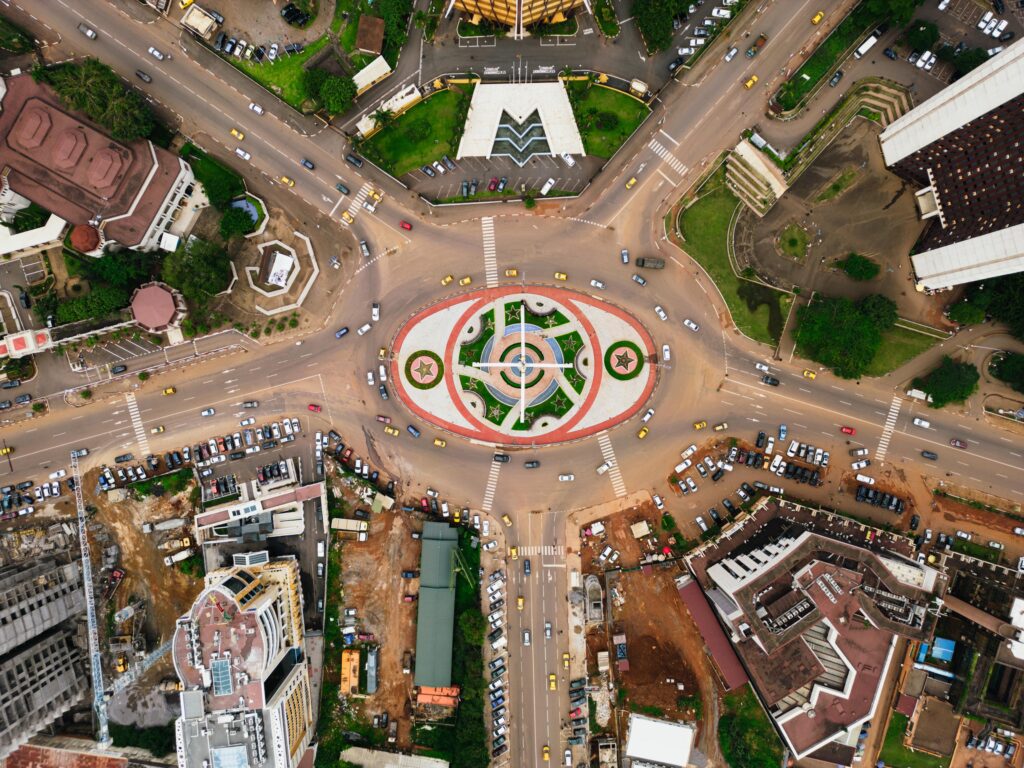
Ease of Doing Business Index Scores
Overall score: 46.1 (2020)
Starting a Business score: 86.3 (2020)
Trading across Borders score: 16.0 (2020)
Enforcing Contracts score: 39.9 (2020)
Legal System: Cameroon has a dual system of both French civil law and English common law which operate in coexistence.
Company creation procedures:
- A public notary drafts a certificate requesting a commercial bank to open a bank account for the new company
- Deposit the initial capital in a bank and obtain a receipt
- Have an attorney/notary or shareholders draft the memorandum and article of association; sign company bylaws before the notary
- Apply for company registration at the One-Stop-Shop (CFCE) and request the publication of a notice of incorporation
- Register the company and employees with the National Social Insurance Fund (Caisse Nationale de Prévoyance Sociale, CNPS)
CIPA (Cameroon Investment Promotion Agency)
ClPA offers the following services to investors:
- Reception, assistance, and guidance of foreign and domestic investors at all stages involved in setting up their investment projects;
- Receiving and examining application files for approval under one of the schedules of the Investment Charter and the structuring projects schedule established by the General Tax Code;
- Obtaining the necessary visas for expatriate staff related to the execution of their investment programs and for the stay of their foreign personnel in Cameroon;
- Assisting approved companies at all the necessary stages related to carrying out their investment programs;
- Establishing, in collaboration with the relevant technical services, simplified administrative procedures for activities approved under the investment code;
- Ensuring the follow-up, monitoring, and implementation of commitments made by approved companies.
Why invest in Cameroon?
- A receptive country for productive foreign investments, reflecting institutional stability, a constantly growing economy (5% growth rate), and an open and democratic society
- The strategic geographical location in the heart of Africa, characterized by a wide variety of landscapes and a rich cultural diversity, conferring a true way of life.
- Cameroon is the entry port for the economies of Chad and Central African Republic two landlocked countries. All their maritime imports arrive through Douala and Kribi ports in Cameroon.
- Crossroads of Peoples offers a unique commercial position, open on the Atlantic Ocean, sharing a border with five other countries of Central Africa and giving access to the 120 million Nigerian consumers. Abundant, reliable, and inexpensive electric power (Hydropower potential is 23 GW is the second largest in sub-Saharan Africa) and a considerable water supply network
- Abundant, qualified, and cheap manpower endowed with a great capacity to adapt and take initiative, all essential for the development of companies
- Diversified industrial fabric under expansion, with a permanent outsourcing network
- Legislative and regulatory framework that guarantees the freedom to invest and free transfer of industrial and trade profits as well as wages
- Availability of many natural resources (oil, gas, bauxite, timber, iron, nickel, etc.) and agricultural produce (cocoa, coffee, cotton, banana, rubber, palm oil, pineapple, etc.);
- Extensive program to implement major development projects (ports, hydroelectric dams, bridges) including the Kribi Deep Water Port construction project, the dams of Mekin, Memve’ele, and Lom Pangar, the Douala-Yaounde expressway construction project, etc.
- Modern communication and telecommunication infrastructure with a developed road and rail network linking the various regions of the country, a reliable air and sea link, and a high-performance telecommunication system
- New attractive law instituting private investment incentives;
- Simplification of administrative procedures with the law on e-commerce and e-payments
- Creation of a one-stop shop at the Investment Promotion Agency to ease the creation of enterprises and obtaining approvals, as well as reception desks at all airports to issue entry visas to foreign investors
- Abundant natural resources, as well as sites and attractions, are ranked among UNESCO heritage.
- Dynamic Education and Training infrastructure which place Cameroon among Sub-Saharan African countries with the highest education rates.
- A young and skilled force.
- Modern communication and telecommunication infrastructure, including roads, seaports, railways, and airports with openings to the sea, to the CEMAC and ACCAS zones, and to Nigeria.
Health
Before Coming to Cameroon, a valid yellow fever Vaccination should be obtained and documented on the yellow vaccine card that should accompany your passport.
It is strongly recommended that you visit a travel vaccination clinic and get other vaccinations and prophylaxis for malaria.
COVID-19
If you have proof of your COVID-19 vaccinations, you don’t need to present a negative COVID-19 (PCR) test to enter Cameroon. If you don’t have proof of your COVID-19 vaccinations, you’ll need to present a negative COVID-19 (PCR) test taken no more than 72 hours before boarding your flight. Entry and exit conditions can change at short notice.
Immigration
Cameroon visa application procedures formerly cumbersome and slow were greatly improved as of April 30th, 2023. Today all applications for entry visas to Cameroon can be submitted online exclusively via the platform www.evisacam.cm. Through the platform applicants do an online pre-enrolment followed by the online payment of required fees, then the application is processed by the competent Cameroon diplomatic mission within 72 hours. For approved requests, an online visa issuance authorization along with a QR code is emailed to the applicant. Lastly the Biometric enrolment and affixing of the visa sticker at the competent Diplomatic Mission.
The main entry points in Cameroon are Douala and Yaoundé International Airports.
Cameroon Travel Business Assistance
Are you planning to move your business to Cameroon or open up Cameroon as a new market? Perhaps there is a conference in Cameroon you need to attend and you need some help. We are here for your Cameroon Travel business assistance.
